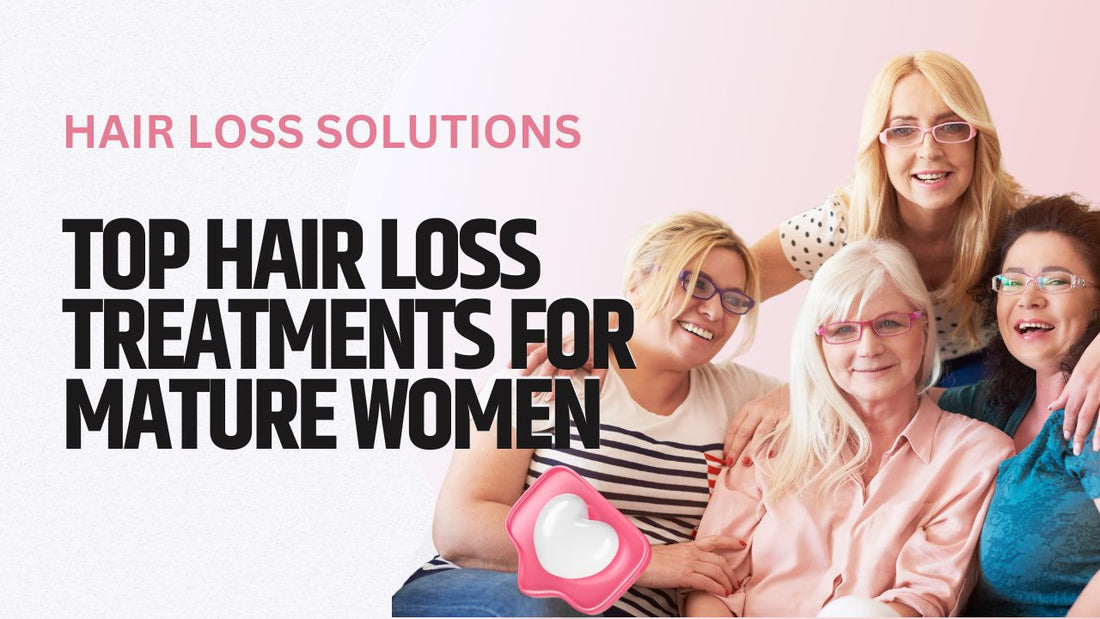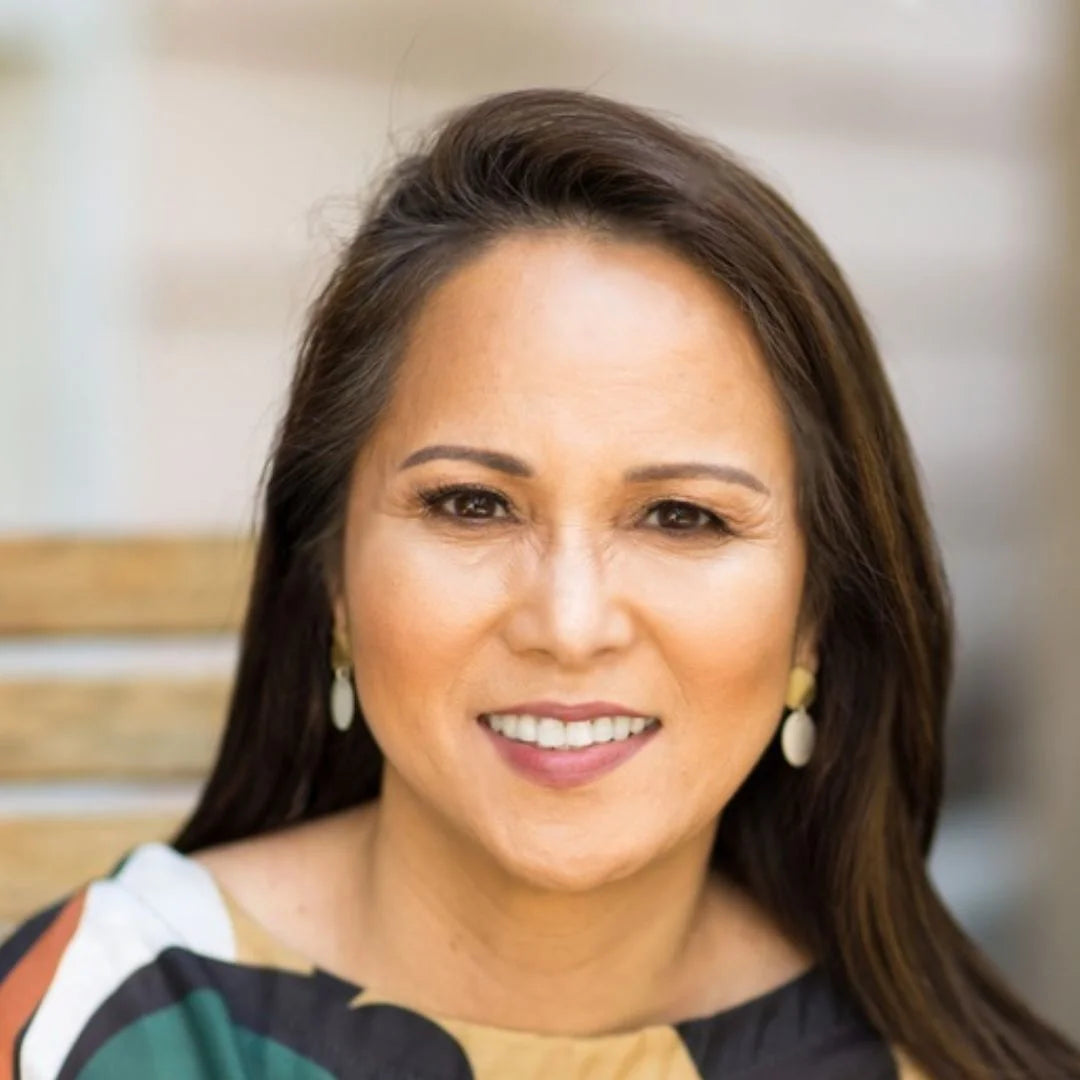
Top Hair Loss Treatments for Mature Women
Share
Hair is often seen as a crowning glory, especially for women. As we age, it's not uncommon to experience changes in hair density and health. For mature women, hair loss can become a notable concern, affecting not just physical appearance but also emotional well-being. This article aims to explore the breadth of hair loss treatments available, providing support and actionable guidance to those looking to reclaim the vitality of their hair.

Understanding Hair Loss in Mature Women
Hair growth is a dynamic process influenced by various factors including genetics, hormonal changes, and overall health. In mature women, these factors often converge, leading to a common issue: hair loss. Distinguishing between normal hair shedding, which involves losing 50 to 100 hairs a day, and hair loss is crucial. By understanding this distinction, we can better identify and address the underlying causes.

Common Types of Hair Loss in Mature Women
Androgenetic alopecia, commonly known as female pattern hair loss, is prevalent among mature women. This genetic condition is characterized by thinning hair and is influenced by hormonal changes. Telogen effluvium, another type of hair loss, can occur following stress, surgery, or illness, leading to widespread thinning. Alopecia areata, an autoimmune disorder, and traction alopecia, resulting from certain hairstyles, are also types of hair loss that mature women may experience.

Medical Treatments for Hair Loss
Minoxidil is a topical treatment that can effectively promote hair regrowth in women, and it's the cornerstone of many treatment regimens. Finasteride, while more commonly used in men, has shown promise in some women under strict medical supervision. Hormone replacement therapy may also play a role, though it comes with potential risks and must be carefully considered. Platelet-rich plasma (PRP) therapy has emerged as a novel approach, offering hope through its growth factor-rich injections.

Nutritional and Lifestyle Changes
The foundation of good hair health lies in proper nutrition and lifestyle choices. A balanced diet, rich in essential vitamins and minerals, supports the hair follicles and promotes growth. Reducing stress through various management techniques is equally important, as stress can precipitate or exacerbate hair loss.
Natural Remedies and Alternative Treatments
For those seeking a more natural approach, herbal remedies like saw palmetto may offer solace. Essential oils, particularly rosemary oil, have been associated with stimulating hair growth and improving scalp health. Additionally, alternative treatments such as acupuncture have been proposed as methods to enhance circulation and encourage hair health.

Proactive Approaches with Hair Care Products
Taking a proactive stance in hair care can make a significant difference in managing hair loss. High-quality shampoos and conditioners formulated for thinning hair can help fortify hair strands from root to tip. One standout product is the Proactive Rosemary Hair Booster Oil, infused with rosemary essential oil, known for its hair growth-promoting properties. Regular use can nourish the scalp and create an optimal environment for hair growth.
Understanding and Selecting Hair Growth Supplements
Supplements can also play a crucial role in hair health for mature women. Biotin, iron, vitamin D, and zinc supplements may aid those with deficiencies linked to hair loss. Before starting any supplement regimen, it's essential to consult with a healthcare provider to tailor a program based on individual needs and to ensure it doesn't interfere with other medications.

The Role of Hair Transplants and Surgical Options
Hair transplants and other surgical options remain at the forefront for those looking for a permanent solution to hair loss. Techniques like follicular unit transplantation (FUT) and follicular unit extraction (FUE) can restore hair by transplanting healthy hair follicles to thinning areas. These procedures have evolved significantly, offering natural-looking results with minimal downtime.

Embracing Hair Pieces and Wigs
While undergoing treatment, hairpieces and wigs offer an immediate solution for hair loss. They come in various styles and colors, allowing for personal expression and confidence. Choosing high-quality, natural-looking wigs can enhance comfort and provide a seamless appearance.
The Importance of Regular Scalp Care
A healthy scalp is the foundation of healthy hair. Maintaining scalp health through regular massages can stimulate blood flow, promoting hair growth. Moreover, choosing products that don't contain harsh chemicals and keeping the scalp clean will prevent issues like dandruff, which can exacerbate hair shedding.
Maintaining a Healthy Lifestyle
Beyond targeted treatments and hair care products, maintaining a healthy lifestyle cannot be overstated. Regular exercise, sufficient sleep, and a stress-reduced environment contribute to overall health and, by extension, the health of your hair. A body in balance is more likely to have a balanced hair growth cycle.

Managing Expectations and Patience in Treatment
Mature women need to manage expectations when treating hair loss. Regrowth and thickening of hair take time, and patience is essential. Consistency with treatment plans is key, and being proactive in addressing potential side effects or ineffectiveness by consulting with a healthcare provider can make all the difference.
Integrating Hair Care Treatments into Your Daily Routine
For mature women confronting hair shedding, integrating effective hair care treatments into daily routines is pivotal. This means setting aside time for scalp massages, perhaps incorporating them into your relaxation routine before bed. Using products like the Proactive Rosemary Hair Booster Oil can become a part of your nightly regimen, infusing your scalp with beneficial nutrients and the soothing scent of rosemary.
Lifestyle Adjustments to Support Hair Health
Beyond topical treatments, lifestyle adjustments can have a substantial impact. This includes a balanced diet rich in hair-healthy nutrients such as omega-3 fatty acids, proteins, and vitamins. Reducing stress through mindfulness practices like yoga or meditation can also positively affect hair health by lowering stress hormones that contribute to hair loss.

Building a Support System
Navigating hair loss is not just a physical journey, but an emotional one as well. Building a support system with friends, family, or online communities can provide the emotional sustenance needed during this time. Sharing experiences and tips can offer comfort and practical guidance.
When to Consult a Professional
Understanding when to seek professional help is crucial. If hair loss is sudden or accompanied by other symptoms, it may be a sign of an underlying health issue that requires medical attention. A dermatologist specializing in hair loss can offer diagnostic tools and treatments that might not be available over the counter or in lifestyle adjustments.

Embracing Your Natural Beauty
While hair is often seen as a significant aspect of personal identity, it's important to remember that beauty and self-worth are not solely defined by hair. Embracing your natural beauty, with or without hair, is a powerful stance. Many women find strength in accepting their changing appearance and focusing on the qualities that truly define them.

Looking Forward: Innovations in Hair Loss Treatment
The field of hair loss treatment is continuously evolving, with new research and technologies emerging regularly. Staying informed about these advancements can provide hope and potential new avenues for treatment in the future.
Final Thoughts: Journeying Towards Hair Recovery with Confidence
In conclusion, while hair shedding can be a challenging issue for mature women, there are numerous pathways to address it, each with its own merits. By understanding the causes of hair shedding, exploring treatment options, and making lifestyle adjustments, women can tackle this issue with confidence. The journey towards hair recovery is personal and unique for each individual, but with the right information and support, it is a journey that can be undertaken with hope and optimism.
Frequently Asked Questions
How long does it take to see results from hair growth treatments?
Results vary based on the treatment, individual health factors, and adherence to the regimen. It may take several months to notice significant changes.
Are natural oils like rosemary oil scientifically proven to help with hair growth?
Research indicates that certain natural oils can have beneficial effects on hair growth due to their properties that improve blood circulation and provide essential nutrients to hair follicles.
Can dietary changes really improve hair health?
Yes, a diet lacking essential nutrients can lead to hair loss, so incorporating a balanced diet can support hair health.
Is hair loss always a natural part of aging?
While hair thinning is common with age, it's not inevitable. Genetics, health, and environmental factors also play significant roles.
What is the best way to choose a wig or hairpiece?
Consulting with a specialist to match hair color and texture, and considering the shape of your face and personal style, are key steps in choosing the right wig or hairpiece.

















